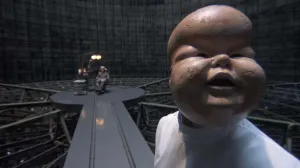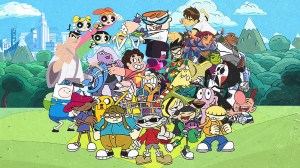It’s been two years since The Umbrella Academy‘s second season and the series’ return is like a warm hug after being stuck in a car in the rain. While the extended break between the batch of episodes has felt like a lifetime, the show itself hasn’t lost any of its charm or momentum, picking up immediately after the major cliffhanger that ended Season 2. Fans of the comic series hoping for even a passing resemblance to the third volume of the Gerard Way and Gabriel Bá source material will be left wanting, however, as the series continues pushing itself further away from its basis in favor of telling its own tale. In the grand scheme, this isn’t a terrible thing; if you’re a fan of these characters and this world, it’s like new stories that include them. That said, it still manages to find ways to squander some of its potential, at least in the early part of its season.
Videos by ComicBook.com
Much like Season 2, Emmy Raver-Lampman’s Allison is given the heaviest dramatic weight of the entire season, carrying the most compelling aspect of the larger plot and the heaviest scenes as a performer. It seems odd that the series frames her as the fourth lead in the credits when she is frequently given the most to do on screen and really becomes the anchor of Season 3’s entire story arc. While others may steal the spotlight with their comedic relief, Raver-Lampman is the beating heart of The Umbrella Academy Season 3 and it’s stronger for choosing that as a direction for its narrative.
Elliot Page’s character is given the chance to mirror their real-life transition, changing from Vanya to Viktor in something that appears incredibly cathartic for them as a performer but also gives the audience the chance to see how easy the acceptance of such a change really is. Page is probably given the second-biggest pallet to hold in the show’s dramatic arc, carrying it well along with his character’s own new foundation.
Those tired of Tom Hopper’s Luther being an affable mope will be pleased to know that he finds happiness in Season 3 while maintaining his status as the picture-perfect example of a lovable himbo. He, along with Robert Sheehan’s Klaus, remain some of the funniest members of the cast, though both are given their fair share of drama to navigate, delivering us equally fun and heavy versions of their characters. Ritu Arya’s Lila manages to be a little more palatable in Season 3 as well, further exploring her relationship with David Castañeda’s Diego in interesting places.
The biggest surprise of the show’s cast, however, is that Colm Feore is given much more to do as Sir Reginald Hargreeves, showing off sides of the character that paint a bigger picture of who he is, not only for readers of the comics, but for those that only watch the show. Dare I say it, the series nearly makes you feel bad for him. Aidan Gallagher’s Five is also still a fun presence, though is perhaps starting to feel one-note through no fault of his own, as the material is simply feeling recycled at times.
Central to the main conflict of Season 3 is The Sparrow Academy, the rival group teased at the end of Season 2. Mostly composed of newcomers to the cast, standouts from the group are Britne Oldford’s Fei and Genesis Rodriguez’s Sloane, while Cazzie David’s Jayne, Jake Epstein’s Alphonso, and Justin Cornwell’s Marcus are fun but, on the whole, less interesting. There is the floating psychic alien cube “Christopher,” who is funny but appears only sporadically.
The entire team has a wild new set of powers that sets them apart from the Umbrellas, making them a fresh injection to the series and its visual language. Justin Min reprises the role of Ben with this group, though he’s now a cold and calculated version of himself, standing in direct contrast to the version the Umbrellas knew. Min doesn’t seem as comfortable playing this version of the character and it shows that his antics as a now bossy and arrogant Ben doesn’t play as naturally as others on-screen with similar personalities.
Perhaps the biggest issue with Umbrella Academy Season 3 is that with some frequency, pieces of the story seem to take place off-screen, and even between episodes. This only happens in the early parts of the season, which also have another larger issue, in that they’re built on the tired narrative trope of characters simply not sharing information with each other. By the halfway point, though, this crutch within its storytelling is thrown away, since the larger importance of the plot requires teamwork (surprising no one). Once it ditches this unnecessary leash on its characters, the series is off to the races, with the final five episodes being among its best.
There is one place where The Umbrella Academy took a problem with Season 2 of the series and actively improved itself, too. In the second season, the series would sometimes lean on the need for its characters to suddenly be too tired to use their powers, or unable to use them despite never having an affliction otherwise. This not only doesn’t come up, but the new season actually bends things the other way, giving its characters an expansion of their powers and pushing their abilities into major new territories.
What’s remarkable about The Umbrella Academy Season 3 is how compelling each episode is as a standalone piece of entertainment. This isn’t the place to truly litigate the pros and cons of the binge vs. weekly release models, but Netflix is doing a disservice to both its storytellers and the audience of this series by dumping it all at once. Not only would this season of the show dominate the conversation for 10 weeks with each new episode, but viewers would be captivated. It’s a testament to how good the creatives on this series have done with creating the season that it could function beyond Netflix’s demand and become something to be savored, and it deserves it.
The Umbrella Academy Season 3 remains as unique as ever but manages to stall itself in its early episodes with creative decisions that separate its characters through preposterous means at every turn. Like the first two seasons, the show is at its best when its ensemble is assembled and can work off each other, though part of the series does its best to separate them. Luckily, the actors playing these roles are so firmly rooted in their characters that they’re always compelling even while apart. This season might be the weakest of the three, yet it remains a wholly entertaining series that is unlike anything else being produced on television. It’s a shame that Netflix doesn’t want the world to enjoy it to its fullest potential.
Rating: 4 out of 5
The Umbrella Academy season three premieres in full on June 22nd on Netflix.








